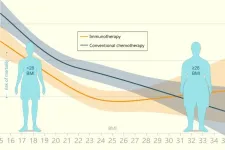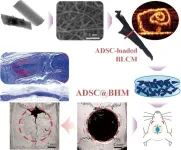(Press-News.org) BOSTON – Concerns about the environmental impact of healthcare decisions rarely enter into conversations between patients and physicians. However, evidence from a new study led by researchers at Dana-Farber Cancer Institute, shows there's broad interest in changing that.
In a series of focus groups conducted in different areas of the United States, doctors and patients expressed openness to considering environmental factors when discussing treatment options. The findings, presented in a paper published online today by Nature Climate Change, suggest that educating physicians about the environmental costs of treatment – and how those costs may be reduced while continuing to deliver excellent care – can be a first step toward that goal.
"Studies have shown that the U.S. healthcare industry is responsible for 8.5% of national greenhouse gases emissions and about 25% of healthcare emissions worldwide," said Andrew Hantel, MD, a faculty member in the Divisions of Leukemia and Population Sciences at Dana-Farber Cancer Institute who led the study with Dana-Farber colleague Gregory Abel, MD, MPH. "The downstream health consequences of these emissions are responsible for the same level of loss of life as pancreatic cancer or colon cancer every year.
"If healthcare emissions are contributing to climate change that is resulting in this level of harm, we wanted to assess if and how physicians view their responsibility to address this issue," he continues. "We also asked patients how willing they would be to make changes in their care that might reduce emissions and limit harm to others."
Researchers conducted seven focus groups – three made up of physicians, four of patients – involving 46 people in all. Patients, on the whole, were interested in talking about these issues and learning about treatment alternatives that are equally effective but less damaging to the environment.
"Asthma or COPD [chronic obstructive pulmonary disease], for example, can be managed in part using powdered or aerosolized inhalers," Hantel relates. "For many patients they're equally effective medications, but powdered inhalers have significant environmental benefits."
Roughly two-thirds of the focus group participants identified as members of racial and ethnic minority groups, who often experience the harshest effects of climate change despite being less responsible for those effects than other groups. Many of them were interested in making environmentally conscious health decisions but wanted to ensure that the main contributors to climate change were also held accountable, researchers found. Some participants expressed a concern that physicians’ paternalism might be a deterrent to having climate-informed discussions with patients.
Many of the physicians in the focus groups incorrectly assumed that patients were not interested in discussing the environmental consequences of health choices, researchers found. Even if patients were interested, physicians said their medical school education hadn't prepared them to address the subject adequately.
At the same time, physicians felt their ability to act in a climate-informed fashion was limited by a healthcare culture oriented toward consumption of natural resources. "There was a sense of systemic headwinds against the kind of changes that can be beneficial for patients as well as the environment," Hantel observes.
Physicians and patients generally agreed that patients' immediate health should be prioritized over environmental concerns. In situations where there's co-benefit, however, both groups were open to actions that reduce environmental impact.
"Our findings point to the need to better educate physicians and health professionals about changes they can make, as well as those they can advocate for within their institutions, which benefit patients but also are less toxic to the environment," Hantel comments. "The goal isn't to shift the burden of climate-informed healthcare decisions onto patients, but to engage with them on these issues and make sure they're a normal part of conversations with their doctors."
The study was supported by the Greenwall Foundation.
END
Study finds doctors and patients interested in environmental impact of health care decisions
2024-09-12
ELSE PRESS RELEASES FROM THIS DATE:
Five key factors predict the response of cancer patients to immunotherapy
2024-09-12
Barcelona, 12 September 2024 – Immunotherapy has transformed cancer treatment in recent years by enabling the immune system to attack tumour cells. However, only 20-40% of patients respond positively to immunotherapy, and these rates vary across different types of cancer. Predicting which patients will respond to immunotherapy and which will not is currently a highly active area of research. Numerous studies conducted so far have focused on the specific characteristics of tumours, their microenvironment, or the patient's immune ...
Trilobite fossils from upstate New York reveal “extra” set of legs
2024-09-12
A new study finds that a trilobite species with exceptionally well-preserved fossils from upstate New York has an additional set of legs underneath its head. The research, led by the American Museum of Natural History and Nanjing University in China, suggests that having a fifth pair of head appendages might be more widespread among trilobites than once thought. Published today in the journal Palaeontology, the study helps researchers better understand how trilobite heads are segmented.
Trilobites are ...
Big algebras: A dictionary of abstract math
2024-09-12
Several fields of mathematics have developed in total isolation, using their own ‘undecipherable’ coded languages. In a new study published in PNAS, Tamás Hausel, professor of mathematics at the Institute of Science and Technology Austria (ISTA), presents “big algebras,” a two-way mathematical ‘dictionary’ between symmetry, algebra, and geometry, that could strengthen the connection between the distant worlds of quantum physics and number theory.
Technical Toolkit: Symmetry and commutativity, from esthetics to functionality
Symmetry is not just a question of esthetics and equilibrium, but also a highly recurrent feature throughout the domains ...
BMI’s relation to cancer therapy mortality risks not so straightforward
2024-09-12
While being overweight increases the risk of developing lifestyle-related diseases, there is a phenomenon known as the obesity paradox where a decreased risk of death has been seen during cancer therapy. However, that paradox might not be the trend for all cancer therapies, an Osaka Metropolitan University team reports in JAMA Network Open, a publication of the American Medical Association.
Led by graduate student Mr. Yasutaka Ihara and Professor Ayumi Shintani of the Graduate School of Medicine’s Department of Medical Statistics, ...
Kids in families with too much screen time struggle with language skills
2024-09-12
Screens have become ubiquitous in our daily lives — which means they’ve also become part of children’s lives too. So what effect does this have on children’s developing brains, especially critical language skills? To understand this, scientists in Estonia surveyed the parents of more than 400 children about their screen use, their children’s screen use, and their children’s language skills. They found that parents who use screens a lot also have children who use screens a lot, and that children’s higher screen time is associated with poorer language skills.
“Our ...
Medical College of Georgia scientists searching for new treatment target for diabetic retinopathy
2024-09-12
Scientists at the Medical College of Georgia at Augusta University are searching for a new treatment target for a common complication of diabetes that can cause retinal blood vessels to break down, leak, or become blocked.
Diabetic retinopathy is a serious eye disease and a leading cause of blindness that results when diabetes’ sustained high blood sugar levels cause damage to the retina – the part of the eye that detects light – over time. That can happen in a number of ways, from inflammation to overgrowth ...
High doses of some prescription stimulants tied to increased psychosis risk
2024-09-12
Prescribing rates for stimulants that treat attention-deficit/hyperactivity disorder (ADHD) have increased significantly over the past decade, with some of the largest increases reported during the COVID-19 pandemic. A new study of adult emergency department admissions at Mass General Brigham, led by McLean Hospital researchers, found that individuals who are taking high doses of amphetamine (e.g. Adderall) face more than a five-fold increased risk for developing psychosis or mania. Findings were published September 12th in the American Journal of Psychiatry.
Overall, individuals with past-month prescription amphetamine use had a greater likelihood of new-onset psychosis or mania ...
New national survey shows hesitancy about vaccines this fall
2024-09-12
With flu season just around the corner and COVID-19 cases on the rise, a new nationwide survey from The Ohio State University Wexner Medical Center reveals hesitancy around vaccines this fall. The new data comes just as this year’s flu shot rolls out and following the FDA’s approval of an updated round of COVID-19 vaccines.
The national poll of 1,006 people found more than one-third (37%) have gotten vaccines in the past but do not plan to this year. The same percent of respondents said they don’t need any of the vaccines surveyed in the poll, including flu, COVID-19, pneumococcal and respiratory ...
Revolutionary tubular scaffolds boost stem cell-driven bone regeneration in skull defects
2024-09-12
Scientists from Sun Yat-sen University's School of Biomedical Engineering have developed groundbreaking tubular scaffolds made from electrospun membranes, which significantly enhance bone regeneration in critical skull defects. These scaffolds, designed to mimic natural bone structures, create an ideal environment for adipose-derived stem cells (rADSCs) to thrive and accelerate healing. By integrating advanced materials like polycaprolactone, PLGA, and nano-hydroxyapatite, the researchers achieved remarkable results in both lab and animal studies, ...
UTokyo attosecond institute welcomes Nobel laureate
2024-09-12
Nobel laureate Pierre Agostini, winner of the 2023 prize in physics, will headline a special two-day event hosted by the University of Tokyo on Sept. 26-27. The keynote lecture by Agostini, renowned for this pioneering work in attosecond science, will be part of a larger symposium bringing together researchers from around the world to celebrate the university’s planned Attosecond Laser Facility (ALFA), and discuss the latest developments and future directions of attosecond science.
Have you taken a photo of a fast-moving animal or vehicle and noticed how blurry the subject can be? This is likely because the faster a moving subject is, the faster the camera’s shutter needs ...





